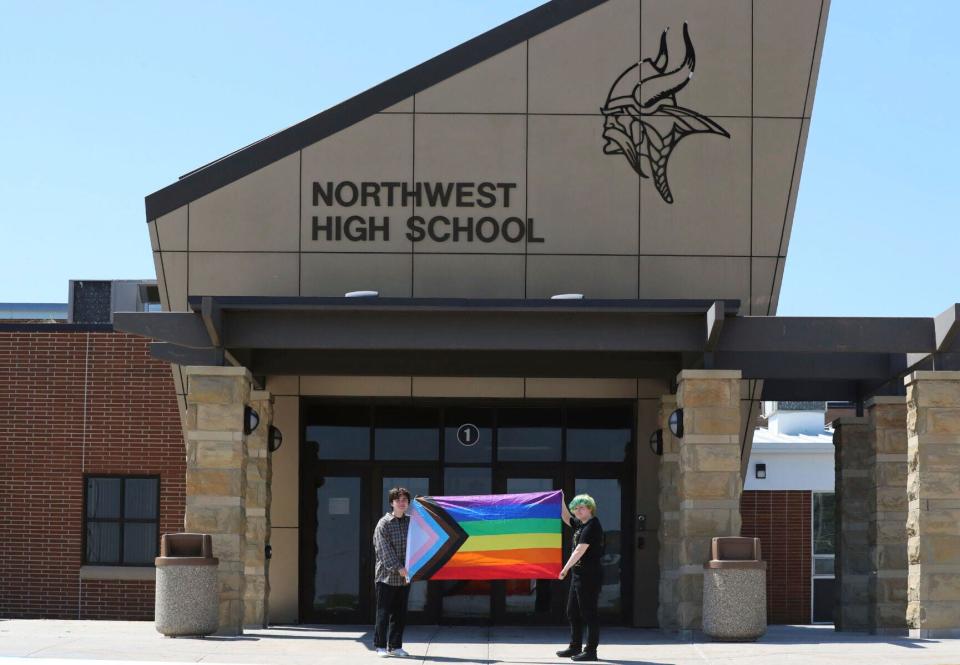US support for LGBTQ rights grows even as gap widens between Democrats and Republicans, survey says
American support for LGBTQ community acceptance is higher than ever, though the gap between Democrats and Republicans is widening, a national research group survey found.
The findings reflect consistently high but largely partisan public support of gay marriage and nondiscrimination laws protecting LGBTQ people, with most frowning upon business owners who cite religion as a reason to refuse service to the LGBTQ community.
“Familiarity makes people more accepting of those rights,” said Melissa Deckman, CEO of the Public Religion Research Institute, the nonpartisan group that conducted the poll. “When you look at Generation Z, more younger people are identifying as part of that movement, so as Americans become exposed to more LGBTQ people, it’s having the effect of making them more supportive.”
One in 10 Americans identify as LGBTQ, the survey found, and LGBTQ Americans are more than twice as likely to be under 30.
Michael Lawlor, a former Connecticut state representative, said LGBTQ support has grown steadily over several decades.
“A lot of it has to do with the fact that people are coming out to other people – their families, friends, neighbors and co-workers," said Lawlor, an associate professor of criminal justice at the University of New Haven. “When you can relate to someone on an individual basis, it really makes a difference.”
Support rose faster among Democrats
The institute’s 2022 American Values Atlas survey collected answers to questions about gay marriage, nondiscrimination laws and religiously based service refusals from nearly 23,000 adults nationwide.
It found that about 8 in 10 people favor laws protecting gay, lesbian, bisexual and transgender people from discrimination in employment, housing and public accommodations.
Even among the five states least likely to favor such laws, support hovered near two-thirds – including in Alabama, where 69% of respondents were in favor; South Carolina, 68%; Nebraska, 67%; South Dakota, 67%; and Oklahoma, 65%.
Support for nondiscrimination laws has risen overall since 2015, rising 12 percentage points among Democrats (78% to 90%), 9 points among independents (73% to 82%) and 5 points among Republicans (61% to 66%).
“It’s striking that public opinion is very different than what’s happening in some state legislatures, and that’s something people should pay attention to,” Deckman said.

Nearly two-thirds of Americans continue to oppose letting businesses refuse service to LGBTQ people on religious grounds. Democrats were more than twice as likely (86%) than Republicans (41%) to oppose such refusals.
Opposition was strong among nearly all religious groups: More than 70% of Jews, Muslims, Buddhists and Black Protestants (73%); Hindus (77%); Hispanic Catholics (78%); and Unitarian Universalists (88%) opposed religiously based service refusals. In contrast, just half of Orthodox Christians (51%) and Jehovah’s Witnesses (50%) and fewer than half of Latter-day Saints (46%) and white evangelical Protestants (37%) oppose such refusals.
Deckman said that issue is one to watch as the Supreme Court is expected to rule this year in the case of Colorado web designer Lorie Smith, who is asking the state not to compel her to create web pages for same-sex weddings, which she said conflict with her religious beliefs.
Progress is not without backlash
Broader acceptance of LGBTQ rights has not come without backlash, especially among conservative Christians and other religious groups.
“Clearly a minority of the country – and you see this in many school districts – are fighting back against rights being largely accepted in other parts of the country,” Deckman said.
The backlash is strongest in Southern states, exemplified by Florida’s so-called Don’t Say Gay bill and, more commonly, legislation targeting transgender and gender identity issues.
On those issues, Deckman said, “American opinion is a little less set. ... Younger Americans and Democrats are generally more accepting of people with different gender identities, where older and more conservative Americans are not on board at all.”

Lawlor noted that while gay marriage was a divisive question 20 years ago, it’s not so much so anymore. Today’s conservative candidates and politicians emphasize topics like drag queens or transgender athletes participating in high school sports, but he suspects those, too, will be relatively short-lived.
“They’re trying to find things that are unsettling to people, like books in school libraries that talk about sex,” he said. “People who might be OK with gay marriage might not be so OK with that stuff.”
Political candidates have seized on that discomfort, he said, especially in swing states where a few percentage points can sway an election.
“This stuff has a half-life,” he said. “Five or 10 years from now all of these things will be non-issues, but for now they have enough of an effect on people that they can affect the outcome of an election. ... It’s a craven attempt to get people to vote a certain way.”
Dig deeper:
'War' on LGBTQ existence: 8 ways the record onslaught of 650 bills targets the community
Pride flags: Bans on LGBTQ Pride flag spark debate about inclusion, civil rights
LGBTQ, police relationship is fraught wi: Can department liaisons help?
This article originally appeared on USA TODAY: LGBTQ rights: US support at all-time high, polarization widens; survey

